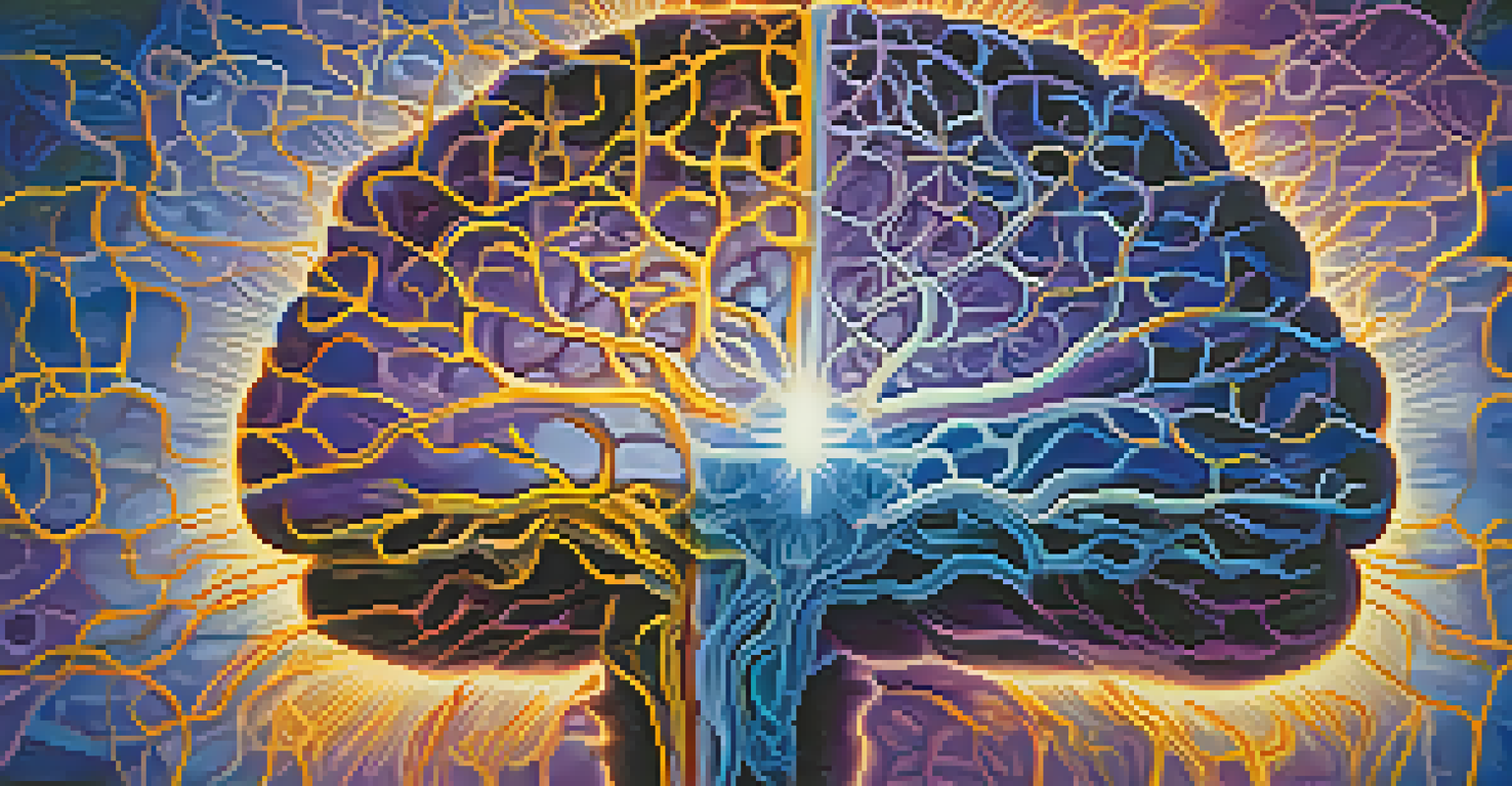Neuroscience Insights into Spiritual Experiences and Practices

Understanding the Brain's Role in Spiritual Experiences
At its core, the brain is a complex organ that processes thoughts, emotions, and experiences. When we engage in spiritual practices, such as meditation or prayer, distinct areas of the brain become active. This suggests that spiritual experiences are not just abstract concepts but can be mapped to specific neural activities.
The brain is a wonderful organ. It starts working the moment you get up and does not stop until you get into the office.
For example, studies have shown that the prefrontal cortex, which is involved in self-regulation and higher-order thinking, lights up during meditation. This finding indicates that spiritual practices may enhance our ability to focus and reflect, potentially leading to greater self-awareness and emotional balance.
By understanding the neuroscience behind these experiences, we can appreciate how deeply intertwined our biology is with our spiritual lives. This intersection opens up new avenues for exploring how spiritual practices can be beneficial not only for the soul but also for mental health.
The Impact of Meditation on Brain Function
Meditation has long been a staple in many spiritual traditions, and recent research suggests it has profound effects on brain function. During meditation, individuals often report feelings of peace and connectedness, and neuroscience validates these experiences. Functional MRI scans reveal changes in brain structure and activity in long-term meditators compared to non-meditators.

Specifically, areas associated with attention, emotion regulation, and even empathy show increased activity and volume. This suggests that regular meditation can enhance our capacity for emotional resilience and compassion towards others, fostering a deeper sense of connection.
Brain Activity and Spiritual Practices
Engaging in spiritual practices like meditation and prayer activates specific areas of the brain, suggesting a deep connection between spirituality and neuroscience.
As we continue to explore the neuroscience of meditation, it's clear that this practice does more than quiet the mind; it may also reshape our brains in ways that promote overall well-being and spiritual growth.
Neurological Correlates of Mystical Experiences
Mystical experiences—those profound moments of connection or transcendence—are often described in spiritual contexts. Neuroscience offers insights into these experiences, indicating that they may arise from specific brain states. Research has shown that certain brain waves, particularly theta waves, are prevalent during deep meditation or spiritual ecstasy.
Meditation is the discovery that the point of life is always arrived at in the immediate moment.
These theta waves are associated with relaxation, intuition, and creativity, creating a fertile ground for mystical experiences to flourish. When individuals enter these states, they often report feelings of unity with the universe or a deep understanding of existence.
Understanding the neurological underpinnings of mystical experiences helps demystify them, showing that they are not just subjective feelings but can be explained through observable brain activity. This knowledge can encourage more people to explore spirituality without skepticism.
The Science Behind Prayer and Its Effects on the Brain
Prayer is another spiritual practice that many engage in, each with unique intentions and methods. Neuroscience has investigated how prayer can influence the brain, revealing that it often activates the same areas linked to social bonding and emotional regulation. This suggests that prayer might not only be a way to connect with a higher power but also a means of fostering community and personal well-being.
Studies have shown that individuals who pray regularly may experience lower levels of stress and anxiety. This could be due to the calming effects of prayer, which often involves mindfulness and reflection, similar to meditation. The repetitive nature of prayer can also create a sense of rhythm that soothes the mind.
Meditation Enhances Emotional Resilience
Regular meditation can increase brain activity in areas related to attention and empathy, fostering emotional resilience and a sense of connection.
By examining the brain's response to prayer, we can see how it serves a dual purpose: enhancing spiritual connectivity while also promoting mental health. Understanding this connection can empower individuals to incorporate prayer into their daily routines.
How Spirituality Influences Brain Health and Well-Being
Spirituality, whether expressed through organized religion or personal practices, can have a significant impact on our overall health. Research suggests that individuals who engage in regular spiritual practices tend to have lower rates of depression and anxiety. This correlation highlights how spiritual engagement can serve as a protective factor for mental health.
Moreover, spirituality often encourages community involvement and social support, both of which are crucial for emotional well-being. The brain thrives on social connections, and being part of a spiritual community can enhance feelings of belonging and purpose.
As we explore the relationship between spirituality and brain health, it becomes clear that fostering a spiritual practice can be a valuable tool in promoting a balanced and fulfilling life.
Neuroscience and the Therapeutic Benefits of Spiritual Practices
Integrating spiritual practices into therapeutic settings has gained traction in recent years. Therapists are increasingly recognizing the potential benefits of spirituality in healing and recovery. Neuroscience supports this approach by showing that spiritual activities can activate the brain's reward centers, promoting feelings of happiness and contentment.
For instance, mindfulness-based therapies often incorporate elements of spirituality, leading to improved emotional regulation and stress reduction. These practices can help individuals find meaning in their experiences, which is crucial for coping with trauma and loss.
Spirituality Promotes Mental Health
Individuals who actively engage in spiritual practices tend to experience lower levels of depression and anxiety, highlighting the mental health benefits of spirituality.
By embracing the therapeutic potential of spirituality, mental health professionals can provide a more holistic approach to treatment, addressing not just the mind but also the spirit, ultimately leading to more comprehensive healing.
Future Directions in Neuroscience and Spirituality Research
As the field of neuroscience continues to evolve, so too does our understanding of spirituality. Future research is likely to delve deeper into how various spiritual practices affect brain function and mental health. This could lead to personalized approaches where individuals can identify spiritual practices that align with their unique neurological profiles.
Emerging technologies like neurofeedback may offer new ways to explore the brain's response to spirituality, allowing for real-time insights into how different practices influence mental states. This could revolutionize how we approach spirituality and mental well-being, making it more accessible and tailored to individual needs.

Overall, the intersection of neuroscience and spirituality holds great promise for enhancing our understanding of the human experience. By continuing to explore this connection, we can unlock new pathways to health, happiness, and spiritual fulfillment.